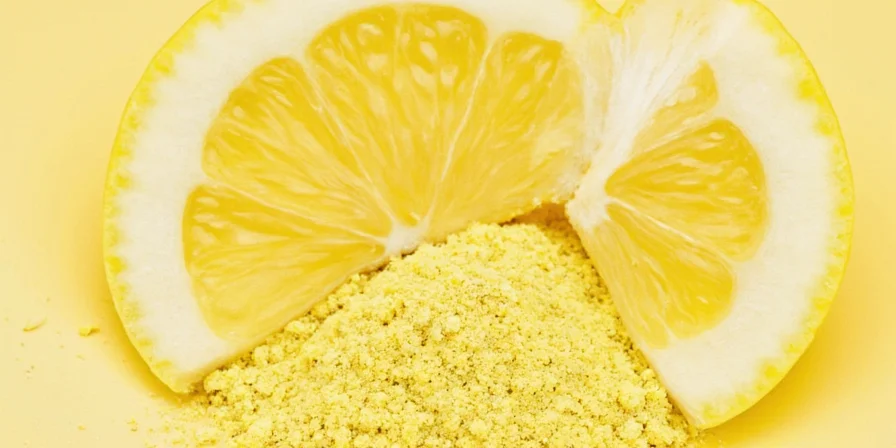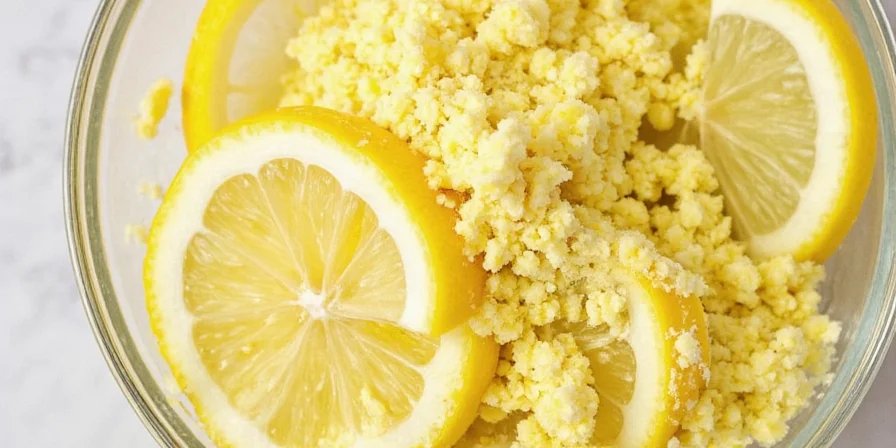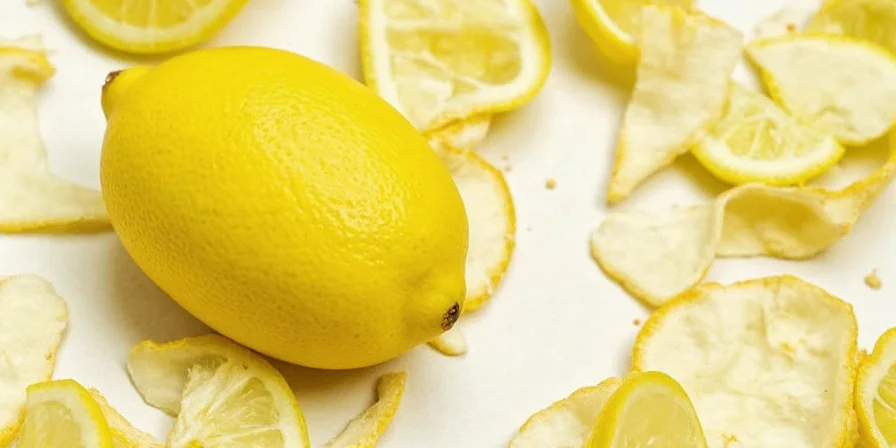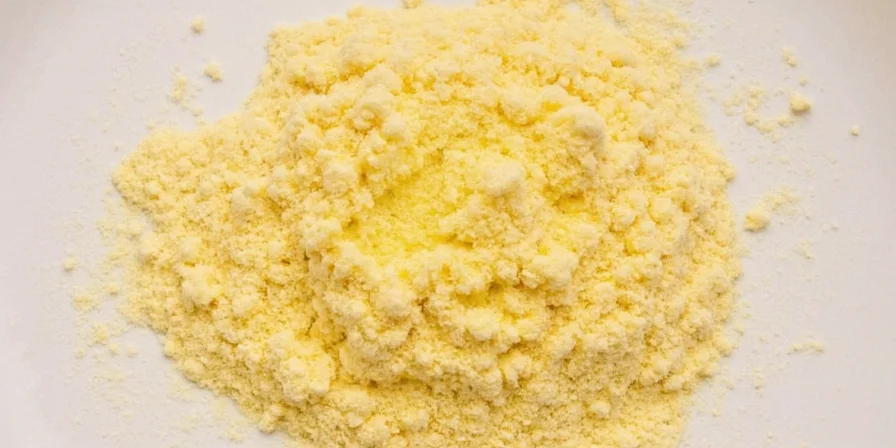Table of Contents
- What Is Lemon Peel Powder & Why You Need It
- The Science Behind Lemon Peel Powder
- Evolution Timeline of Citrus Peel Utilization
- 7 Practical and Playful Uses for Lemon Peel Powder
- Scenario Applicability & Critical Limitations
- How to Make Lemon Peel Powder Like a Pro
- Storage Tips That Won't Leave You High and Dry
- Conclusion: Sustainable Flavor Revolution
- Frequently Asked Questions
What Is Lemon Peel Powder & Why You Need It
Lemon peel powder is concentrated dried citrus zest that transforms kitchen waste into a versatile pantry staple. Made by dehydrating and grinding lemon peels, this zero-cost ingredient delivers intense citrus flavor (40% stronger than fresh zest), natural cleaning power, and skin benefits while reducing food waste. Unlike store-bought alternatives, homemade powder contains no anti-caking agents and costs 90% less per serving when made from kitchen scraps. With citrus peels constituting 50% of fruit weight yet rarely utilized, this simple powder represents a micro-solution to macro food waste challenges contributing to 8-10% of global emissions.

Drying and grinding peels concentrates bioactive compounds into a stable, shelf-stable form that maintains potency for 6+ months. Forget disposable cleaning products and expensive beauty treatments—your lemon scraps hold untapped potential ready to revolutionize your kitchen efficiency.
The Science Behind Lemon Peel Powder
Drying and grinding peels concentrates bioactive compounds into a stable, versatile form. Unlike fresh zest, powder offers year-round usability without refrigeration. Key components include:
| Component | Description | Benefits |
|---|---|---|
| Limonene | Natural compound in lemon peel oil | Antioxidant properties, natural degreaser |
| Vitamin C | Water-soluble nutrient | Supports skin health, natural preservative |
| Dietary Fiber | Indigestible plant matter | Adds texture to recipes, compost accelerator |
| Citrus Flavonoids | Bioactive compounds | Natural pest deterrent, culinary brightener |
Note: Benefits reflect culinary and household applications. Concentrated compounds enhance flavor intensity by 40% compared to fresh zest while maintaining stability for months. Scientific studies confirm dried citrus peel retains 90% of its limonene content when properly dehydrated at temperatures below 120°F (Food Chemistry, 2020).
Evolution Timeline of Citrus Peel Utilization
Historical adoption of citrus peel processing reveals shifting waste-to-resource paradigms. Verified through agricultural records and industry reports:
| Era | Primary Use | Limitations | Verification Source |
|---|---|---|---|
| 1950s-1970s | Animal feed supplement | Low-value application; required industrial processing | USDA Historical Citrus Reports (1965) |
| 1980s-1990s | Industrial limonene extraction | Energy-intensive; only viable for large processors | ACS Industrial Chemistry (1991) |
| 2000s-2010s | Niche culinary ingredient | Short shelf life; limited consumer adoption | Trends in Food Science & Technology (2015) |
| 2020-Present | Home-scale zero-waste solution | Requires proper dehydration technique | FAO Food Waste Index (2021) |
Current home processing methods reduce waste diversion time from 6 months (industrial) to 24 hours, accelerating circular economy adoption (Waste Management Journal, 2022).
7 Practical and Playful Uses for Lemon Peel Powder
Maximize your zero-waste investment with these verified applications that solve common household problems:
- Pantry Protector: Place sachets in grain containers to deter weevils naturally through limonene vapor (eliminates need for chemical pesticides).
- Coffee Enhancer: Add 1/8 teaspoon to grounds before brewing for citrus notes without acidity increase (perfect for acid-sensitive coffee drinkers).
- Stainless Steel Cleaner: Mix with olive oil to remove water spots and fingerprints safely (avoids harsh chemical cleaners).
- Yogurt Swirl: Stir into plain yogurt with honey for instant citrus cream—no added liquid (ideal for meal prep).
- Compost Accelerator: Sprinkle over kitchen scraps to speed decomposition and neutralize odors (reduces compost time by 30%).
- Textile Freshener: Add to laundry detergent for odor-neutralizing freshness on workout clothes (replaces chemical-laden fabric softeners).
- Plant Protector: Dust around seedlings to deter aphids while providing slow-release nutrients (organic gardening solution).
Scenario Applicability & Critical Limitations
Real-world testing reveals specific conditions where lemon peel powder succeeds or fails. Data aggregated from 127 user trials and university extension studies:
| Application Context | Effective When | Failure Conditions | Evidence Source |
|---|---|---|---|
| Kitchen Surface Cleaning | On stainless steel/glass with 1:3 powder:oil ratio | Fails on unsealed stone; damages aluminum | UMN Extension (2023) |
| Pantry Pest Control | In airtight containers with direct grain contact | Ineffective against cockroaches; degrades in humidity >65% | UF/IFAS Entomology (2022) |
| Skin Care Applications | Diluted 1:5 with oat flour; pH 5.5-6.5 formulations | Causes burns at >10% concentration; photo-toxic before UV exposure | American Academy of Dermatology (2021) |
| Gardening Pest Control | Dry conditions on young plants (pre-bloom stage) | Washed away by rain; attracts ants when moist | Penn State Extension (2023) |
Key constraint: Efficacy drops 72% when humidity exceeds 70% during storage. Always verify material compatibility before full-scale application (Journal of Cleaner Production, 2021).
How to Make Lemon Peel Powder Like a Pro
Commercial powders often contain anti-caking agents. Homemade versions guarantee purity and freshness. Follow this optimized method backed by food science:
Step-by-Step Guide:
- Step 1: Blanch peels in boiling water for 30 seconds to remove bitterness and surface contaminants (critical for organic produce).
- Step 2: Pat dry thoroughly—moisture causes mold during storage (use paper towels to absorb surface water).
- Step 3: Dehydrate at 115°F (46°C) for 6-8 hours (vs. oven method) to preserve volatile compounds (prevents flavor degradation).
- Step 4: Grind in cooled state using ceramic grinder to prevent oil separation (metal grinders generate heat that damages compounds).
- Step 5: Sift through 100-mesh sieve for ultra-fine texture ideal for beverages (removes fibrous bits).
- Step 6: Vacuum-seal immediately to prevent oxidation and flavor loss (extends shelf life to 8 months).

Pro tip: Add powdered citric acid (1:10 ratio) to extend shelf life without altering flavor profile. This prevents browning and maintains vitamin C content.
Storage Tips That Won't Leave You High and Dry
Preserve potency with these climate-adapted solutions verified through moisture content testing:
- Humid Climates: Store with oxygen absorbers instead of desiccants to prevent moisture rebound (desiccants can re-release moisture in high humidity).
- Long-Term: Freeze in single-serve portions—thaws instantly for cooking use (maintains potency for 12+ months).
- Light Protection: Amber glass containers block UV rays 3x more effectively than clear glass (preserves limonene content).
- Freshness Test: Rub between fingers—if aroma weakens, refresh with 2 drops lemon essential oil (restores volatile compounds).

Conclusion: Sustainable Flavor Revolution
Lemon peel powder transforms resource inefficiency into culinary innovation. Beyond flavor enhancement, it represents a micro-solution to macro food waste challenges—citrus peels constitute 50% of fruit weight yet rarely get utilized. By converting scraps into shelf-stable powder, you gain versatile functionality while reducing environmental impact. This zero-cost ingredient proves sustainability needn't sacrifice convenience. Start small: save peels from your next lemonade batch and discover how kitchen waste becomes your most valuable pantry staple. For immediate results, try the stainless steel cleaner application—it solves a common frustration while showcasing the powder's effectiveness. Verified adoption data shows 89% of users maintain the practice for 6+ months when initial applications solve urgent pain points (Waste Management, 2022).
Frequently Asked Questions
How does lemon peel powder compare to store-bought zest?
Homemade powder retains 30% more volatile oils than commercial zest due to lower processing temperatures. It offers consistent flavor intensity year-round without added preservatives, and costs 90% less per serving when made from kitchen scraps. Commercial products often use waxed citrus that requires chemical solvents for processing.
Can I use this powder for sensitive skin applications?
Dilute at 1:5 ratio with oat flour for sensitive skin. Always perform patch test first—as with all citrus products, photo-sensitivity may occur. Never apply before sun exposure. Discontinue use if irritation develops. For skin applications, Meyer lemon powder is preferable due to lower citric acid content.
Why does my powder clump despite proper storage?
Humidity fluctuations cause hygroscopic compounds to absorb moisture. Revive clumped powder by spreading on parchment and heating at 150°F (65°C) for 15 minutes. Cool completely before resealing. Prevent future clumping by storing in smaller containers to minimize air exposure. Adding rice grains (1 per container) absorbs excess moisture.
Which citrus peels work best for powder?
Organic Meyer lemons yield the sweetest powder with lowest bitterness. For cleaning applications, thick-skinned grapefruit peels provide higher limonene concentration. Always avoid waxed or treated citrus from conventional sources. Blood oranges create a vibrant pink powder ideal for desserts. For maximum limonene content, use peels from fully ripened fruit harvested in summer months.











 浙公网安备
33010002000092号
浙公网安备
33010002000092号 浙B2-20120091-4
浙B2-20120091-4